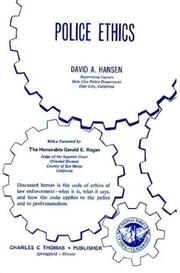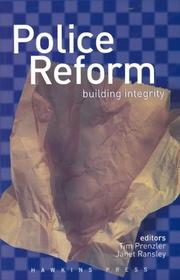| Listing 1 - 10 of 62 | << page >> |
Sort by
|
Book
ISBN: 9616230220 9789616230223 Year: 2000 Publisher: Ljubljana : College of Police and Security Studies,
Abstract | Keywords | Export | Availability | Bookmark
 Loading...
Loading...Choose an application
- Reference Manager
- EndNote
- RefWorks (Direct export to RefWorks)
Police ethics --- Police ethics --- Police ethics
Book
ISBN: 9780857258311 9780857253859 0857253859 Year: 2012 Publisher: London Sage
Abstract | Keywords | Export | Availability | Bookmark
 Loading...
Loading...Choose an application
- Reference Manager
- EndNote
- RefWorks (Direct export to RefWorks)

ISBN: 9780398026486 0398026483 Year: 1973 Publisher: Springfield: Charles C. Thomas,
Abstract | Keywords | Export | Availability | Bookmark
 Loading...
Loading...Choose an application
- Reference Manager
- EndNote
- RefWorks (Direct export to RefWorks)
Book
Year: 2016 Publisher: Oxford : Oxford University Press,
Abstract | Keywords | Export | Availability | Bookmark
 Loading...
Loading...Choose an application
- Reference Manager
- EndNote
- RefWorks (Direct export to RefWorks)
Terrorism, the use of military force in Afghanistan, Iraq and Syria, and the fatal police shootings of unarmed persons have all contributed to renewed interest in the ethics of police and military use of lethal force and its moral justification. In this book, philosopher Seumas Miller analyzes the various moral justifications and moral responsibilities involved in the use of lethal force by police and military combatants, relying on a distinctive normative teleological account of institutional roles. His conception constitutes a novel alternative to prevailing reductive individualist and collectivist accounts. As Miller argues, police and military uses of lethal force are morally justified in part by recourse to fundamental natural moral rights and obligations, especially the right to personal self-defense and the moral obligation to defend the lives of innocent others. Yet the moral justification for police and military use of lethal force is to some extent role-specific. Both police officers and military combatants evidently have an institutionally-based moral duty to put themselves in harm's way to protect others. Under some circumstances, however, police have an institutionally based moral duty to use lethal force to uphold the law; and military combatants have an institutionally based moral duty to use lethal force to win wars. Two key notions in play are joint action and the natural right to self-defense. Miller uses a relational individualist theory of joint actions to construct the notion of multi-layered structures of joint action in order to explicate organizational action. He also provides a novel theory of justifiable killing in self-defense. Over the course of his book, Miller covers a variety of urgent topics, such as police shootings of armed offenders, police shooting of suicide-bombers, targeted killing, autonomous weapons, humanitarian armed intervention, and civilian immunity.
Book
Year: 2016 Publisher: Oxford : Oxford University Press,
Abstract | Keywords | Export | Availability | Bookmark
 Loading...
Loading...Choose an application
- Reference Manager
- EndNote
- RefWorks (Direct export to RefWorks)
Terrorism, the use of military force in Afghanistan, Iraq and Syria, and the fatal police shootings of unarmed persons have all contributed to renewed interest in the ethics of police and military use of lethal force and its moral justification. In this book, philosopher Seumas Miller analyzes the various moral justifications and moral responsibilities involved in the use of lethal force by police and military combatants, relying on a distinctive normative teleological account of institutional roles. His conception constitutes a novel alternative to prevailing reductive individualist and collectivist accounts. As Miller argues, police and military uses of lethal force are morally justified in part by recourse to fundamental natural moral rights and obligations, especially the right to personal self-defense and the moral obligation to defend the lives of innocent others. Yet the moral justification for police and military use of lethal force is to some extent role-specific. Both police officers and military combatants evidently have an institutionally-based moral duty to put themselves in harm's way to protect others. Under some circumstances, however, police have an institutionally based moral duty to use lethal force to uphold the law; and military combatants have an institutionally based moral duty to use lethal force to win wars. Two key notions in play are joint action and the natural right to self-defense. Miller uses a relational individualist theory of joint actions to construct the notion of multi-layered structures of joint action in order to explicate organizational action. He also provides a novel theory of justifiable killing in self-defense. Over the course of his book, Miller covers a variety of urgent topics, such as police shootings of armed offenders, police shooting of suicide-bombers, targeted killing, autonomous weapons, humanitarian armed intervention, and civilian immunity.
Book
Year: 2006 Publisher: Sofia, Bulgaria : Център за изследване на демокрацията,
Abstract | Keywords | Export | Availability | Bookmark
 Loading...
Loading...Choose an application
- Reference Manager
- EndNote
- RefWorks (Direct export to RefWorks)
Докладът "Полицейски проверки и използване на етнически профили в България" е резултат от изследване на полицейските проверки, проведено между юни и декември 2005 г. от Центъра за изследване на демокрацията и агенция "Витоша рисърч" с подкрепата на Правната инициатива на Институт "Отворено общество". Фокус на настоящия анализ са полицейските проверки на лица от ромски произход. Изследването е част от по-широк опит за анализ на този феномен в континентална Европа. Успоредно с България бяха проведени и изследвания в Испания, Унгария и Русия, които показаха, че и там лица от малцинствен произход са подлагани на необосновани полицейски проверки. Полицейските проверки са един от основните инструменти, които полицията използва в противодействието и превенцията на престъпността. Те са дейносттапри която полицията най-често влиза в контакт с гражданите. От правилното или неправилното използване на този важен за полицията инструмент зависи не само ефективността на полицейската работа, но и дали той има негативен ефект върху взаимоотношенията между полицията и гражданите. Основните изводи от доклада "Полицейски проверки и използване на етнически профили в България" представени на 19 септември 2006 г. на открито заседание на Държавно-обществената консултативна комисия по въпросите на превенцията на престъпността.
Book
ISBN: 1111544514 9781111544515 Year: 2013 Publisher: Clifton Park, NY Delmar/Cengage Learning
Abstract | Keywords | Export | Availability | Bookmark
 Loading...
Loading...Choose an application
- Reference Manager
- EndNote
- RefWorks (Direct export to RefWorks)
Book
ISBN: 0398091307 9780398091309 9780398091293 Year: 2016 Publisher: Springfield, Illinois : Charles C Thomas, Publisher, LTD.,
Abstract | Keywords | Export | Availability | Bookmark
 Loading...
Loading...Choose an application
- Reference Manager
- EndNote
- RefWorks (Direct export to RefWorks)
Police ethics. --- Ethics, Police --- Ethics --- Police ethics --- E-books
Book
ISBN: 9782366300758 2366300751 Year: 2018 Publisher: Toulouse: Octarès,
Abstract | Keywords | Export | Availability | Bookmark
 Loading...
Loading...Choose an application
- Reference Manager
- EndNote
- RefWorks (Direct export to RefWorks)
Policiers --- Règle (Philosophie) --- Police ethics --- Rules (Philosophy)

ISBN: 1876067152 Year: 2002 Publisher: Annandale Hawkins press
Abstract | Keywords | Export | Availability | Bookmark
 Loading...
Loading...Choose an application
- Reference Manager
- EndNote
- RefWorks (Direct export to RefWorks)
Police administration --- Police corruption --- Police ethics --- Prevention
| Listing 1 - 10 of 62 | << page >> |
Sort by
|

 Search
Search Feedback
Feedback About UniCat
About UniCat  Help
Help News
News